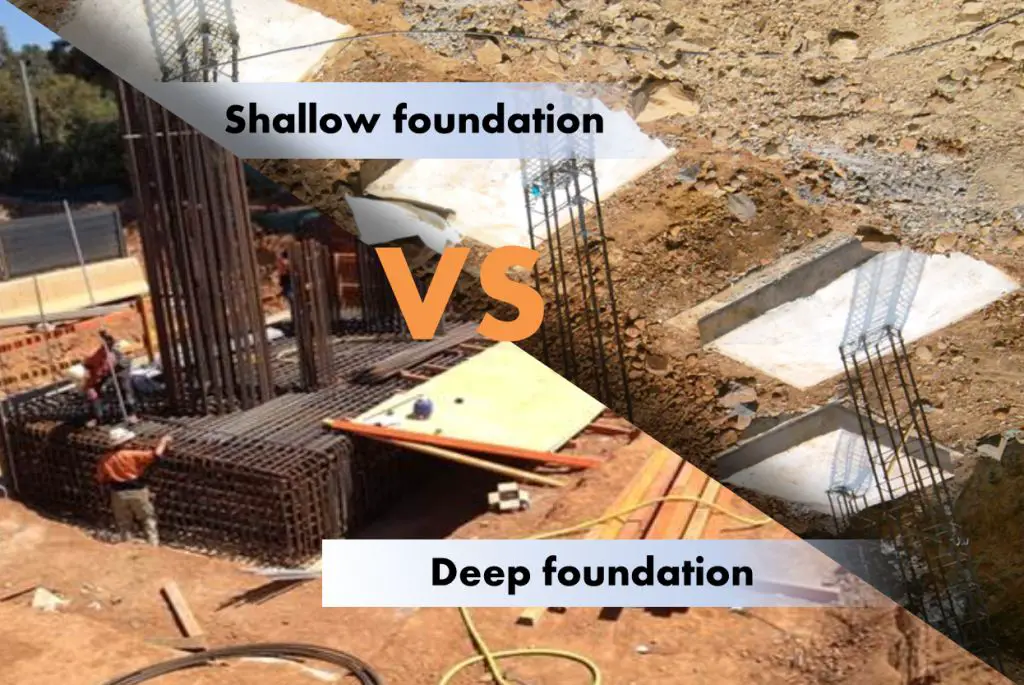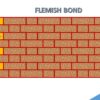Before deciding the type of foundation for structures, it is very important that one must understand the difference between shallow and deep foundation.
Foundation for a structure is generally classified in two broad classes based on the depth i.e. shallow and deep foundation. Depth is an important factor in foundation. According to a lot of studies, it is of no dispute that the as the depth of foundation increases, the ultimate bearing capacity of soil increases.
Bearing capacity is the capacity of the soil to support the loads that are applied to the ground. So, for all the structures we need to select a foundation (whether shallow or deep) that can safely transfer the load from structure to the underneath soil without shear failure or without excessive settlement.
Before understanding the difference of shallow and deep foundation, let’s have a look at the definition.

Shallow Foundation
A foundation is said to be a shallow foundation when the depth of the footing is less than the twice the width of the foundation. We can also state the similar concept by saying that the depth to breadth (width) ratio of shallow foundation is less than or equal to two. For certain cases, it is also said that shallow foundation has depth less than the width of the footing.
Anyhow, the concept is just that the depth of the footing is enough and is just a few meters below the natural ground.
Deep Foundation
Deep foundation has depth more than twice that of the width, and it transfers the load to the deep stratum because it is placed way under the soil.
Experts and designers recommend deep foundation only when the bearing capacity of soil near the ground is very low. The deep foundation takes the load down into the underlying strata and spread it down.
There are three basic types of deep foundations: pile foundation, pier foundation, and well foundation. All these types are further classified into different arrangements and designs to match the specific site requirements.
Now, let’s differentiate shallow and deep foundation.
Difference between Shallow and Deep Foundation
Load transfer mechanism
Deep foundations transfer the load by taking into account the side friction between the soil and footing. So the bearing capacity of deep foundation is increased because of side friction, in addition to usual bearing of the sub soil strata.
Shallow foundation (with most type as spread footing) actually spreads the load of the structure over a greater area by the footing pad and it rely on the direct contact pressure between footing and near to surface soil/rock.
Types
Shallow foundation are usually classified in types like isolated or spread footing, strip footing, combined footing, raft or mat foundation etc. Deep foundations take different types like pile foundation, pier, caissons, shaft,
Uses
Deep foundations are only feasible when the bearing capacity of the soils near surface is not sufficient and there is a need to transfer the load to more competent strata at considerable depth. Deep foundations are only used in heavy structures like bridges, skyscrapers, flyovers, dam structures, or off-shore structures.
[su_box title=”Interesting” box_color=”#4be97f”]Did you know: Burj Khalifa is founded on pile foundation. [/su_box]
For common buildings, concrete frame and wood frame buildings, low rise towers, and small span bridges; shallow foundation or at grade foundation is used.
Shape of footing
Actually the shape varies a lot with the type of foundation but in most of the common deep foundation is a bit circular and cylindrical shape while the shallow foundation is rectangular or square shape.
Depth of footing
The depth of deep foundation is more than 3 times the width of the footing. Depth depends entirely on the nature and amount of loading along with the available of sufficient bearing capacity strata. Deep foundations can go as deep as 20 to 65 meters (60-200ft) whereas shallow foundations can be of depth as low as 3 ft (1 meter).
Economic factors
It is without a doubt that deep foundations are much more expensive than shallow foundations. Shallow foundations are much cheaper because it is easier to construct and doesn’t involve too much labour. The material cost, labor cost, and machinery cost; all are way low in shallow foundation.
Here are some of the actual project pictures for different types of foundation.
[su_slider source=”media: 1481,1480,1479,1478,1477,1476″ limit=”8″ link=”image” target=”blank” height=”360″ speed=”200″]
Here is your turn
I’ve worked hard to make this post so give some respect by sharing it with your friends and subscribing to us via email.
Don’t forget to read below relevant posts.
[su_box title=”More to Read – Lots of Them” style=”glass” box_color=”#f64420″]
- Foundation Failure – Types, Reasons and Remedies
- Advantages & Disadvantage of Raft Foundation
- Benefits of Bentonite Slurry in Pile Foundation
- Isolated Footing – A type of Shallow Foundation
[/su_box]

















